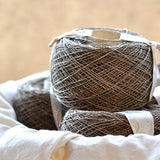Sustainable Impact: the Natural Fiber, Allo [Himalayan Nettle]
Posted on April 29 2016
Kolpa believes - as a consumer, you have the right to ask. At Kolpa, we LOVE sharing the stories of products and its producers. Today, we bring you the story of the “future fiber” - known as Allo, the Himalayan Nettle.

Introduction
Allo [in Nepali] is commonly known as the “Himalayan Wild Nettle” [Girardina diversifolia]. The plant is native to seven Asian countries (Bhutan, China, India, Myanmar, Malaysia, Nepal and Srilanka). In Nepal, Allo is found in the high mountains and historically consumed by indigenous people such as Rai, Sherpa, Magar, Chhetri, and Gurung. Allo’s fiber and fabric are all natural, fully biodegradable and robust. Currently, the use of Allo has gained popularity beyond its native users.
Allo, the plant
Allo grows up to 1.5 to 3 meters tall with perennial rootstocks in the wild between 1,500 to 3,000 meters altitudes. During April plant starts to grow. When it matures it reaches up to 3 meters which is when it contains the best fibers of unique quality.

Allo fiber processing in Nepal
Allo stem is harvested using hands and simple tools. The outer bark is stripped off using teeth. This is a traditional method used by communities for generations. Once completely peeled, they are tied in bundles to sun-dry. The harvesting occurs in December, which is a perfect time to get quality fiber.
Once dried, the bark is soaked [in water] overnight. The overnight soaked bark is boiled for 3 to 4 hours with wood ashes, which is traditionally done at evening. The boiling bark is left to simmer overnight in the fire. The ashes acts as alkali that helps to break the bonds of fibers. In the morning the bark is washed thoroughly in the running water while constantly beating it. Mostly, this is done on the river bank. The running water in the river clears any impurities. Washing and beating is repeated for 2 to 3 times. Then the processed fiber is mixed with special clay [called kamero maato] and dried in the sun for a few days. Once the fiber is dried, the clay is removed by beating with stick and rubbing with hands. This traditional method to extract Allo fiber is still in practice in Nepal.
AND YES, Kolpa uses Allo fabric weaved by women from local communities. Using local Allo fiber and fabric, communities get the benefit that supports their livelihoods. In Nepal, it deeply contributes to the local economy.
Kolpa journey doesn’t end there, we further work with local craftsperson to manufacture beautiful yet functional products such as backpacks, tablet cases, body scrubs, market bags and more. These line of products offered by Kolpa are natural and sustainable.






0 comments